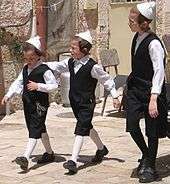Frum
- For people with this surname, see Frum (surname).
.jpg)
Frum (Yiddish פֿרום; [frum | frim]), meaning "devout" or "pious", is a Yiddish adjective. To be frum means to be committed to the observance of Jewish religious law that often exceeds the bare requirements of Halakha, the collective body of Jewish religious laws. This not only includes the careful study of Torah, daily prayers, observing Shabbat and kashrut, and performing deeds of loving-kindness but also many more customs and khumrot. Khumrot are prohibitions or obligations in Jewish life that exceed the requirements of Halakha; some khumrot became customs in some communities over time, e.g. daily ritual immersion in a mikveh in Hasidic Judaism or kapparot in Haredi Judaism.
Someone who is frum is known as a frum Jew, a frummer ("pious one", related to German "ein Frommer") or frummie (Yinglish diminutive "pious one"). These appellations are generally, but not only, applied to Hasidic and Orthodox Judaism, and used by some members of these groups as a self-reference.

_-_The_%22Kaparot%22_Ritual_(1).jpg)
To follow a frum path in life implies the constant maintenance of an awareness of God by following spiritual practice as a makhmir, meaning "taking the stricter position on an issue".[1] In this way, the Ashkenazi frum-culture is variously seen as a precaution against transgressing the Halakha or as a way of keeping those who have taken on the stringency separate from those who have not.
In Ashkenazi Orthodox communities, the Yinglish initialism "FFB," meaning "Frum From Birth," is often used to refer to a person who was born into a religiously observant family and has maintained this lifestyle.
In the Ashkenazi community the adjective frei (Yiddish and German "free") is used as an appellation by Jews with a secular background or by those that adhere to non-Orthodox denominations. A person who calls himself "frei" means one who is less religious and free from the observance of Halakha that exceeds the baseline requirement, or one who is not religiously observant and feels "frei" to do whatever one feels like doing.
Connotations
Someone who is extremely frum is labeled frummer. To be frummer ("more pious", related to German "frommer") means to impose khumra upon khumra and can be connected with the superiority complex.
Frummer can also have a negative connotation similar to Chasid Shoteh ("pious idiot"), which is how the Talmud (Sotah 21B) describes a man who sees a woman drowning but refuses to save her for, he says, "it is not proper to look at her, and rescue her." A frummer in that sense is a person displaying a disproportionate emphasis on technical aspects of religion at the expense of worldly or practical concerns.
Frum can be used in a negative sense for "hypocritically pious", "holier-than-thou", "sanctimonious"; or in a positive sense for: "pious", "devout", "God-fearing" and "upright". A combination is sometimes used to describe someone as "frum and ehrlich", which captures all the positive attributes of these words and would roughly mean "upright" or "righteous" (tzadik).
Frum can have other specific meanings depending on the context in which it is used. It can be used to describe things such as clothes or homes which can be more in line with Jewish law.